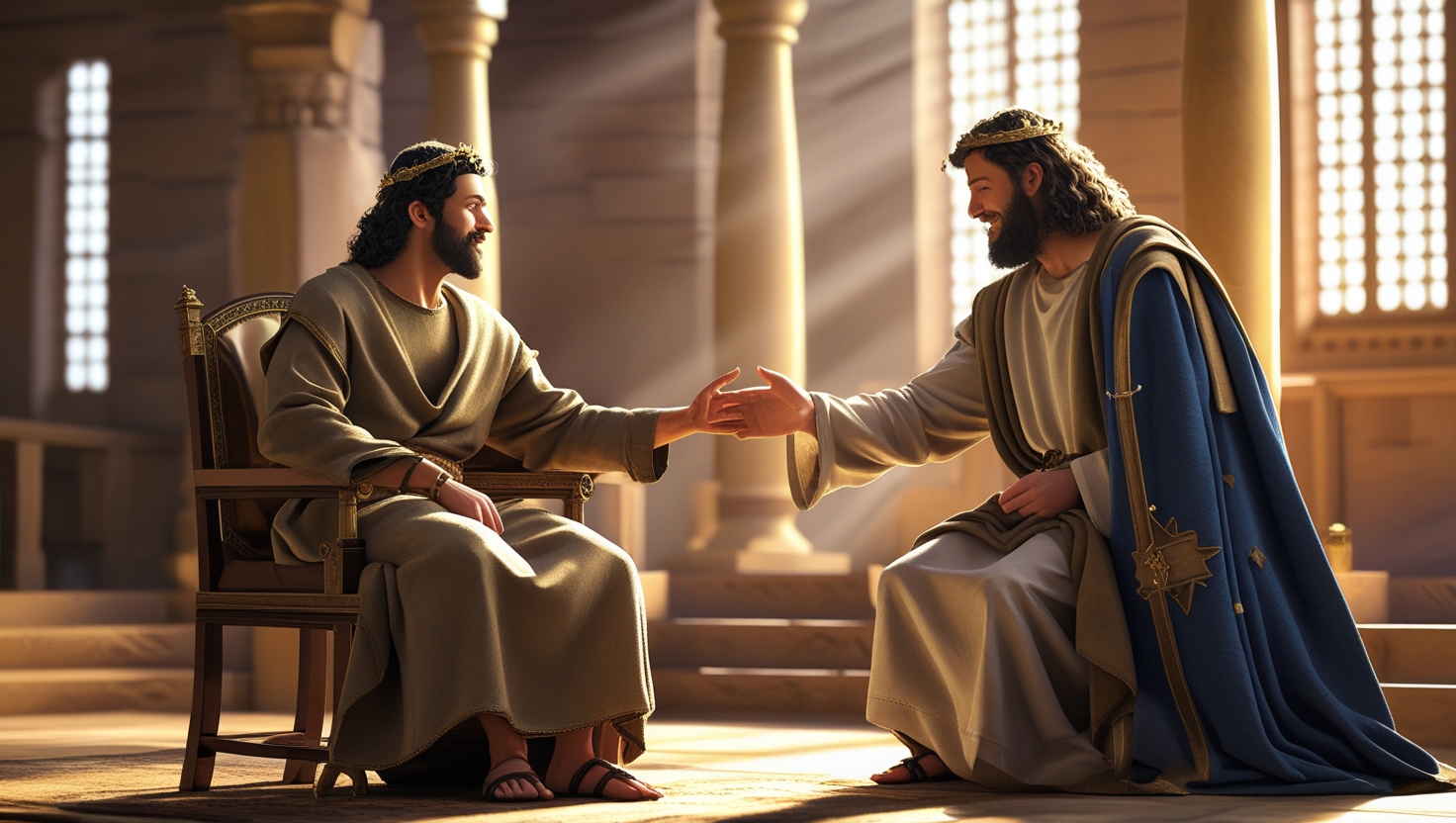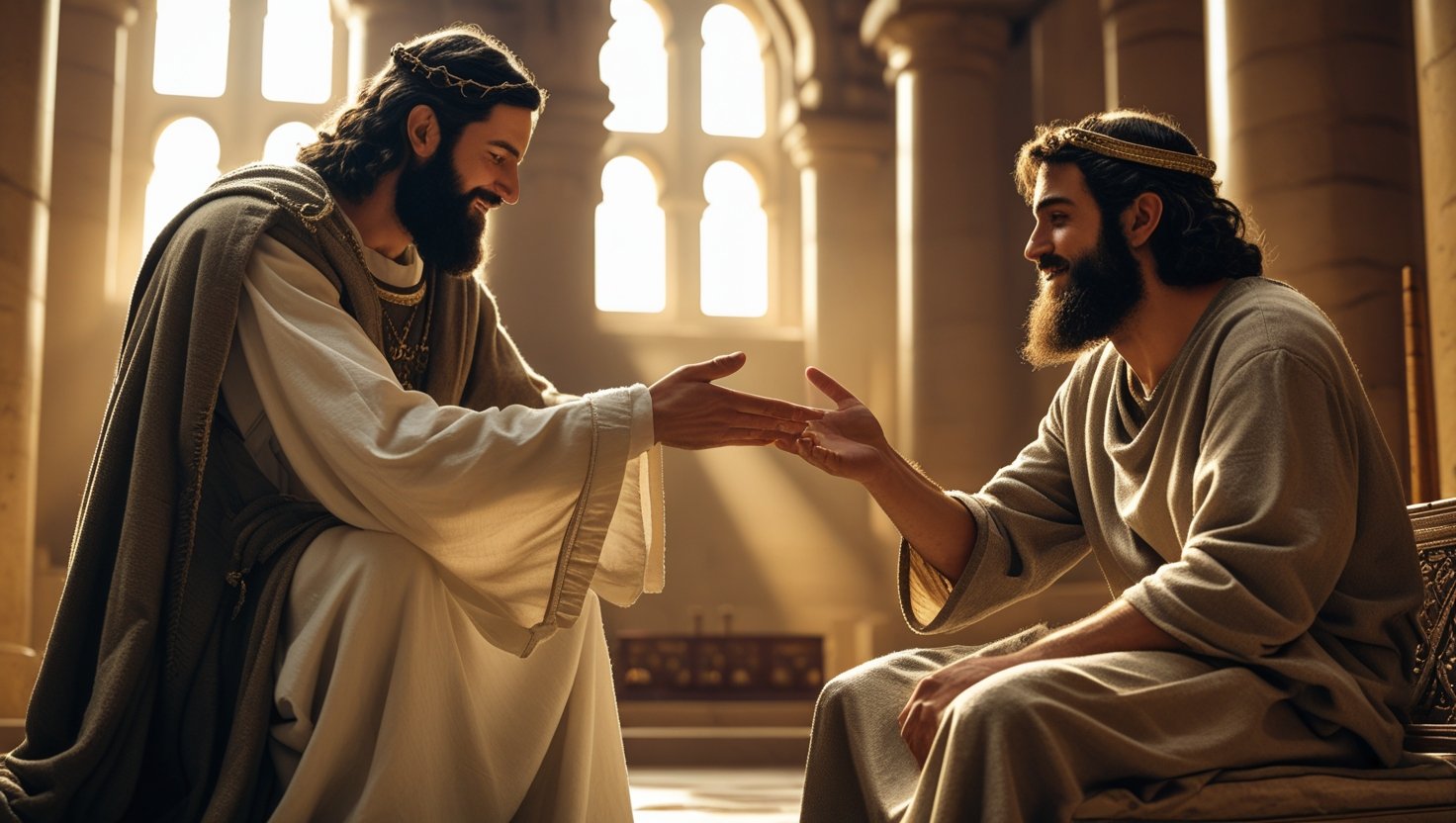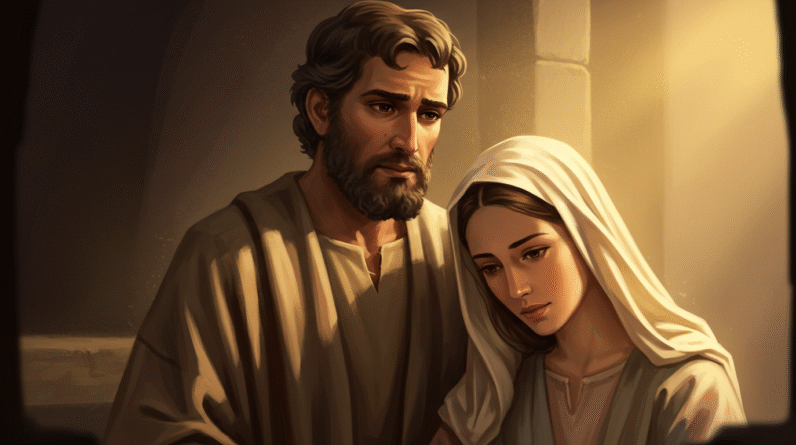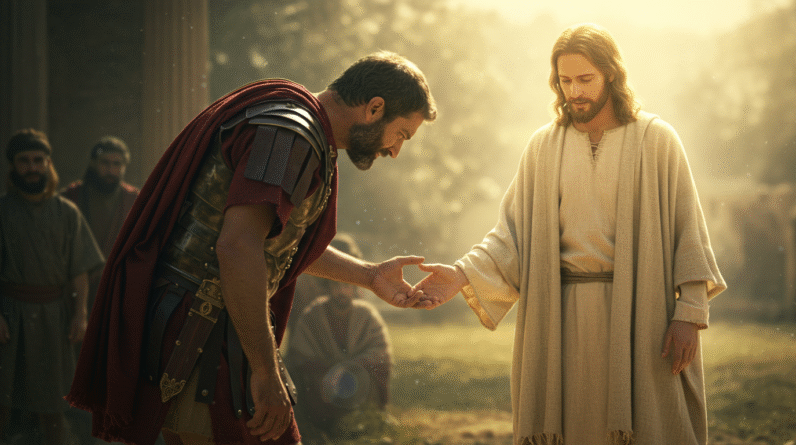Explore unconditional kindness through David and Mephibosheth’s tale. Discover how undeserved grace reshapes your view of worth and divine love.
David and Mephibosheth: Kindness Without Condition
Discovering the Heart of Grace Through a Forgotten Prince
Strong Introduction
Have you ever found yourself feeling out of place? Perhaps you’ve felt unseen, unworthy, or disqualified from love or blessing. It’s a sentiment that’s more common than we often admit. But there’s a beautiful lesson nestled in the pages of an ancient story—a lesson of unearned grace and unshakable kindness. The story of David and Mephibosheth isn’t just an old tale from the Bible; it’s a powerful illustration of how God treats us with a mercy that’s simply undeserved.
Let’s delve into this profound narrative and see how it mirrors the generous and unconditional nature of divine kindness. We’ll walk through a story that could change how you view grace, kindness, and your inherent worth.
Bible Passage Reference
📖 You can find this intriguing story in 2 Samuel 9.
In this chapter, you’ll discover:
- The way David seeks someone to bless in honor of his dear friend, Jonathan.
- The situation of Mephibosheth, a man forgotten and crippled, who is ushered to the king’s table.
- A portrayal of a king’s kindness that has nothing to do with performance or ability.
Context: Mephibosheth belonged to the royal lineage, being the son of Jonathan and grandson of Saul. After the tragic fall of his grandfather’s rule, he found himself living in hiding, shunned and disabled. But David, who held a deep abiding covenant with Jonathan, made a profound decision. He showed kindness that transcended expectation or obligation.
Who Was Mephibosheth?
Mephibosheth might have been a name forgotten by many, but his story is emblematic of grace. He was the son of Jonathan, David’s beloved friend, and the grandson of King Saul. In his youth, Mephibosheth experienced a catastrophic fall that left him crippled in both feet (2 Samuel 4:4).
After the downfall of Saul, Mephibosheth’s life drastically changed. He went into hiding, dwelling in a place called Lo Debar—a name that reflects his status, as it literally means “no pasture.” It symbolizes desolation and obscurity, capturing the essence of his existence. Yet, unbeknownst to him, there was a king thinking of him, tied to an ancient promise.
What Did David Do—and Why?
David’s decision to extend kindness to Mephibosheth was radical for more than one reason. Standard practice in the ancient world would demand that a new king eliminate any remaining family of the former king to secure his position. Yet, David, driven by his unwavering loyalty to Jonathan, posed a simple question filled with intent and kindness: “Is there anyone still left of the house of Saul to whom I can show kindness for Jonathan’s sake?” (2 Samuel 9:1).
Mephibosheth himself bore no illusions about his worthiness to receive the king’s favor. He referred to himself as a “dead dog,” a term that vividly expresses his sense of worthlessness. But David’s response was driven by love, not by merit. He restored Mephibosheth’s grandfather’s lands to him, assigned servants, and granted him a permanent place at the royal table, treating him as one of his sons. It’s a powerful reminder that grace is not earned, but given freely.

What This Teaches Us About God’s Grace
In the story of David and Mephibosheth, there’s a rich parallel to how God treats humanity. Many of us are just like Mephibosheth. We’re spiritually broken, hiding in fear or shame, and unable to earn favor by our merit. Yet, God’s kindness toward us is relentless and unconditional. He extends an invitation that isn’t based on who you are but on who Christ is.
Every time you reflect on this narrative, consider its application to your spiritual journey. You are not defined by your flaws or past mistakes but by the generosity of divine grace. Through Christ, God actively seeks you out, calls you by name, and grants you a seat at His ever-bountiful table.
Life Application Section
Why does this ancient story matter to you today? Because it illuminates a core truth: you don’t have to be perfect to be accepted by God. Like Mephibosheth, we often carry around labels—flawed, forgotten, or disqualified. Yet, the message here is clear: God’s kindness is based not on our worthiness, but on His covenant love through Jesus.
Through Christ:
- God seeks you actively.
- He calls you intimately by name.
- He brings you closer, never pushing you away.
- He gives you a seat, a place, and a belonging at His table.
As Ephesians 2:8-9 reminds us, “For it is by grace you have been saved, through faith… not by works, so that no one can boast.” (Ephesians 2:8-9).
Practical Takeaways
Let’s distill these truths into actionable steps for reflecting on this powerful story:
- God’s kindness is unconditional: You don’t have to earn your place in God’s heart.
- You can show your weakness: Remember, God sees you fully and still welcomes you home.
- Grace is a gift: No amount of striving can replace the humility of receiving.
- Your identity is renewed: You are not defined by shame, but by your new status as a child of the King.
- Accept the invitation to sit at God’s table: Like Mephibosheth, you are invited for life-long communion with Him.
Call to Action
🎯 Do you feel like Mephibosheth—forgotten, broken, or far from the King? You don’t have to remain there. God is calling you to His table, not because you are perfect, but because His love is perfect. 🙏 Will you receive His kindness today and take your place as His beloved child?
Check out the full story in the biblical passage, 📖 You can find this intriguing story in 2 Samuel 9, reflect on its meaning, and see how it speaks to your life. Let this tale of kindness compel you to a deeper understanding of grace and to extend such kindness to others.

🔍 Explore More Bible Insights:
✅ 1. The Role of Eliab – David’s Brother in His Journey to Facing Goliath
Tone: Relational, reflective, character-focused
🔹 “Family Tensions and God’s Purpose – Discover the Connection”
Read it here.»
✅ 2. What Jeremiah 29:11 Means for Us Today
Tone: Hopeful, encouraging, life application
🔹 “God’s Plans Still Stand – Find Your Hope Here”
Read it here.»
✅ 3. The Wise and Foolish Builders – A Strong Foundation in Faith (Matthew 7:24-27)
Tone: Foundational, practical, discipleship
🔹 “Build Your Life on the Rock – Keep Learning”
Read it here.»
✅ 4. The Roman Centurion at the Cross – A Moment of Revelation
Tone: Awe-inspiring, redemptive, gospel-centered
🔹 “From Witness to Believer – Read His Revelation”
Read it here.»
As a ClickBank Affiliate, I earn from qualifying purchases.
Acknowledgment: All Bible verses referenced in this article were accessed via Bible Gateway (or Bible Hub).
“Want to explore more? Check out our latest post on Why Jesus? and discover the life-changing truth of the Gospel!”








